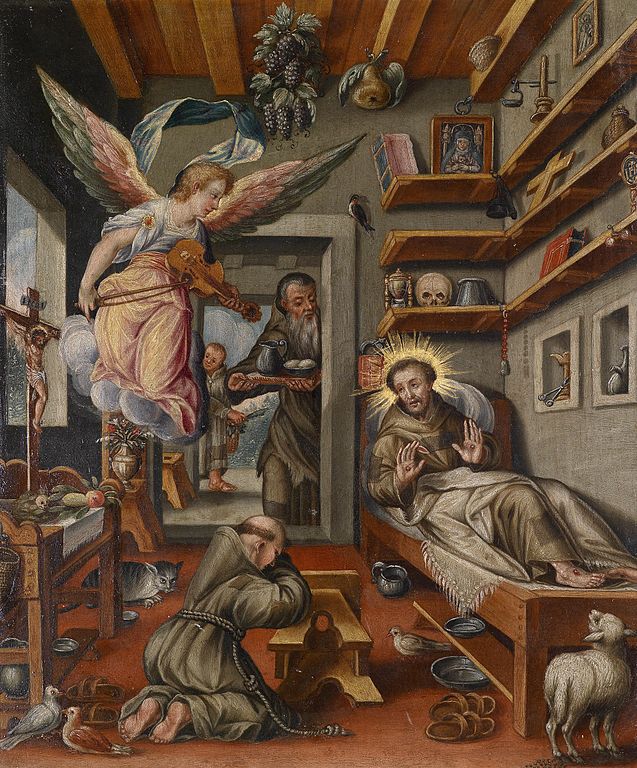 by Theresa Cavicchio
by Theresa CavicchioThe comprehensive Omnibus entitled St. Francis of Assisi: Writings and Early Biographies, published in 1973, is introduced with a statement which rings true still today, close to fifty years later: “There is something paradoxical about the fact that the Little Poor Man of Assisi, who sought only obscurity, should have become so widely known and universally loved as he is today.”
Indeed, one of the most well-loved saints throughout the world, for Christians and non-Christians alike, is Francis of Assisi (1182 – 1226 A.D.). So it is that for many seekers of spiritual growth, environmentalists, animal lovers, and countless others, October 4th each year marks the feast of the humble “Poverello” whose Christ-centered life has impacted the world for over 800 years.
Besides attending Mass for the Memorial, we commonly celebrate this day with the blessing of animals, for example. Among Franciscans, however, October 3rd also is a noteworthy date in its own right, sometimes marked with solemn liturgies. On that date in 1226 A.D., Francis of Assisi was fully aware that his time on this earth was drawing to a close. He spent it with his friars, preparing for his “Transitus,” or passing, from life on earth to new life in heaven.
Early biographers have left us a description of the events of that time of profound sorrow for those close to Francis; for Francis himself, of agonizing physical pain underscored by the glorious hope of heaven.
The setting was the Portiuncula, the “Little Portion,” a tiny chapel outside of Assisi where many momentous events in the life of the Franciscan Orders had taken place. Knowing that his end was near, Francis had asked his friars to carry him there. Having received the sacred Stigmata two years prior, Francis would die bearing the bleeding wounds of the Savior he had striven so diligently to emulate.
Important elements of Franciscan spirituality came to the forefront as the friars mourned the imminent passing of their beloved father in faith:
~ Poverty: Francis’ single-minded determination to live his life as closely as possible to that of his Lord Jesus, who had “nowhere to rest his head” (Mt 8:20), was borne out in the extreme poverty he had practiced. As death approached, he stated his desire to lie naked on the ground. He would give all back to God, ever faithful to his Lady Poverty.
~ The Holy Gospel: Francis’ living out of the Gospel remained to the end. He asked to hear the account in the Gospel of John (13: 1 – 15) of Jesus washing His disciples’ feet. Further recalling the Last Supper, Francis asked for bread, which he blessed, broke, and gave to his friars, just as Jesus had done. His biographer, Thomas of Celano, recounts: “[Francis] did all of this in reverent memory of that [last] supper, showing thereby the deep love he had for his brothers.” Along with poverty, humility and fraternity remained hallmarks of his spirituality to the end.
~ Jesus Crucified: The cross ever before him throughout his ministry, as he lay dying, Francis stretched out his arms in the form of the cross, blessing his brothers in the name of Jesus Crucified.
~ Sacred Scripture: Thomas of Celano recounts how Francis turned to God through Sacred Scripture in his final hours, stating that Francis “as far as he was able, broke forth in this psalm: ‘I cried to the Lord with my voice: with my voice I made supplication to the Lord’” (Ps 142).
~ Creation: At Francis’ request, two friars sang his Canticle of the Sun, praising God in all of Creation, including “Our Sister Bodily Death.” Celano relates: “[Francis] exhorted death itself, terrible and hateful to all, to give praise [to God], and going joyfully to meet it, he invited it to make its lodging with him. ‘Welcome,’ he said, ‘my sister death’.”
As recorded by another early biographer, Saint Bonaventure, Francis’ suffering “was so great that there was not a single part of him which did not have its share of agony; he had no flesh left and his skin seemed to cling to his bones.”
When Francis’ Transitus had been accomplished, and his earthly journey had come finally to its end, the change in his physical appearance was remarkable. Saint Bonaventure states that Francis’ skin, “became shining white, giving us some idea of the beauty which will belong to the bodies of the saints in heaven.”
Saint Bonaventure also provides our conclusion, characterizing Francis as having “attained the height of sanctity. He was a model of penance, a herald of truth, a mirror of holiness, and an example of Gospel perfection, but poverty was his profession … he was marked out by the practice of all the virtues.”
As we contemplate the deeply spiritual Transitus of Saint Francis, we turn to the Collect from the Memorial Mass of October 4th:
“O God, by whose gift Saint Francis was conformed to Christ in poverty and humility, grant that, by walking in Francis’ footsteps, we may follow your Son, and, through joyful charity, come to be united with you. Through our Lord Jesus Christ, your Son, who lives and reigns with you in the unity of the Holy Spirit, God, forever and ever. Amen.”
© All Rights Reserved, Living His Life Abundantly®/Women of Grace® http://www.womenofgrace.com
